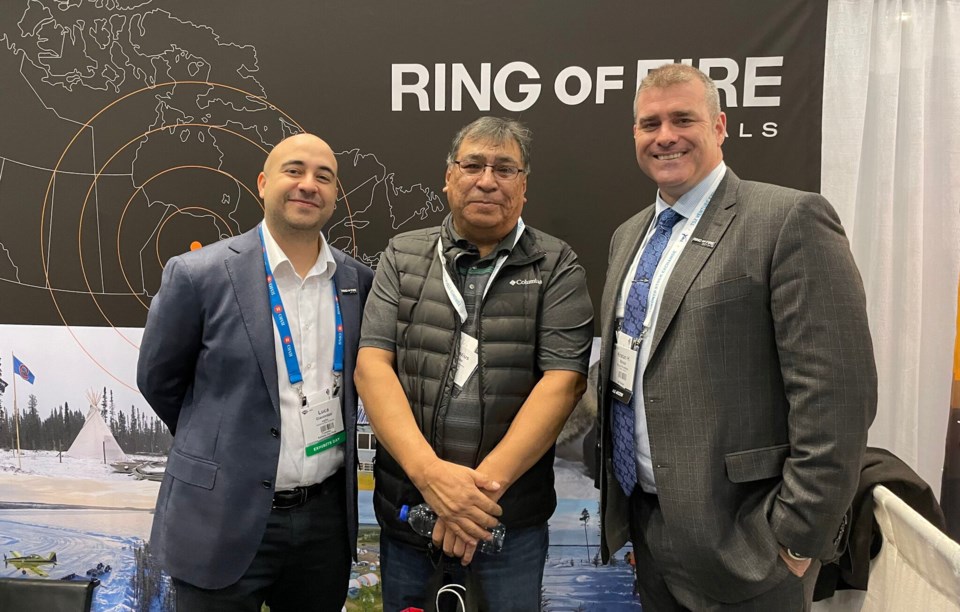Talk of a weekend snowstorm about to hit Sudbury rings up pangs of jealousy from Kristan Straub.
A weather forecast calling for 30 to 50 centimetres of fresh powder is cause for impending calamity in the 'burbs of the GTA where the newly appointed CEO of Ring of Fire Metals now resides.
But to Straub, 48, it's a siren call to the snowmobile trails for the Sudbury-raised outdoor enthusiast. For now, those recreational pursuits will have to be put on hold.
On March 1, Straub was introduced as the new boss of the Australian-owned James Bay mine developer, just days prior to the start of the PDAC mining conference in Toronto, one of the industry's biggest global get-togethers. He was recruited from Glencore where was vice-president of exploration with the nickel team.
He's the crowning choice in a new cast of the former Noront Resources management team as its Perth-based parent company, Wyloo Metals, puts its stamp on the company and the Eagle's Nest project it acquired in the spring of 2022.
“I had a wonderful career with Glencore for 22 years and quite frankly wasn’t looking for a change,” said Straub. “I had fantastic opportunities within that company.”
Straub said the position was too enticing to pass up. It's an opportunity to build the one of the world's largest undeveloped, high-grade nickel, copper and palladium deposits from the ground up — in a region of the Far North that’s never had development — while working symbiotically with two partnering First Nations.
Sign up for the Sudbury Mining Solutions weekly newsletter here.
Webequie and Marten Falls are the two communities closest to the Far North mineral belt, more than 500 kilometres northwest of Thunder Bay. They are the road proponents for the north-south access roads.
"To me, this is a generational project in Ontario and Canada where we have the opportunity to create infrastructure that brings meaningful change to the communities," said Straub, "but also the opportunity to build an operation that now contributes to a decarbonized future and a green economy in Ontario."
His two decades of grooming with Glencore had prepared him for the role.
Raised on Rix Street in Falconbridge, an outlying community on the east end of the City of Greater Sudbury, in the shadow of the Glencore smelter, Straub jokes he spent 20 years growing up there and "20 years wanting to get out of Falconbridge."
Mining is in the family bloodlines.
His dad was a technician at the Falconbridge smelter down the street and also worked at the company's East Mine, which closed in 1990. He had followed in the footsteps of his father, a Swiss immigrant who came to Sudbury and worked as a labourer for INCO.
Straub's mother is Indigenous from the Killarney area, not far from Henvey Inlet where he is a proud member. His maternal grandfather worked in mining for a short period before taking a job at Ontario Hydro in Sudbury.
His Indigenous roots, he acknowledges, offer him a perspective and an understanding to First Nation sensitivities surrounding industrial impacts to the land.
As a project geologist, he served on the discovery teams for the Nickel Rim and Fraser Morgan mines in Sudbury and the Kabanaga nickel project in Tanzania.
As vice-president of operations at Glencore’s Raglan Mine in northern Québec, part of the job was nurturing the impact benefit agreement (IBA), first signed in 1995, with the host Inuit communities. It was the first IBA between a Canadian mining company and an Aboriginal group of communities.
“That interaction of managing that (agreement) and renewing it has also given me a tremendous understanding from an operational perspective of the dealings that are ongoing.”
Want to read more stories about business in the North? Subscribe to our newsletter.
In New Caledonia, as head of Koniambo Nickel, Glencore’s majority partner, the Northern Province, represented the Indigenous population there. It was an education to learn the intricacies of permitting and get involved in developing Indigenous-led businesses. The four-and-a-half-year experience reinforced his beliefs in the importance of engagement, maintaining open dialogue, and being solution-oriented.
"I think it fits very well with what we're looking to build here out of the Eagle's Nest."
After 15 years of mostly inertia in the Ring of Fire, since the discovery of nickel and chromite resources, the Ford government is on the fast track to get new mines into production.
PDAC 2023 was the stage for the province to announce the approval of the terms of reference (an agreed-upon work plan) to proceed with the environmental assessment (EA) of the Northern Road Link, more commonly known as the north-south road.
Straub said it bodes well for the future, bringing “certainty” with relatively fixed timelines to complete the environmental assessment. It allows the company to concurrently run its own EA for Eagle’s Nest and to start looking ahead to permitting and planning for construction on how all the infrastructure will tie together.
As to when Eagle's Nest might go into production or if development in the Ring of Fire might commence within five years, Straub answers it’s "just too early to comment,” pending regulatory decisions on what mitigative environmental measures might be necessary.
Noront Resources had cultivated good relations with Webequie and Marten Falls. That level of comfort led to the signing of a recent memorandum of understanding with Webequie and Marten Falls.
However, mine and road project resistance and consultation issues remain with the outlying communities of Neskantaga and Attawapiskat.
Straub said they will maintain open lines of communication with those communities.
He mentions many of the community's needs, like access to clean water, is not something the company can immediately tackle: “that’s a government discussion that needs to be addressed.”
“Each of us has a role to play,” said Straub, with industry, government and First Nations in discussing consultation on road access and future mining operations.
The challenge remains in all parties making themselves available to advance a “meaningful discussion.”



